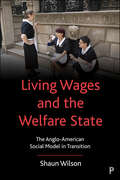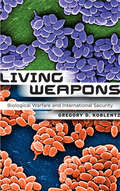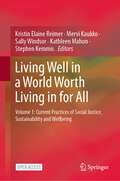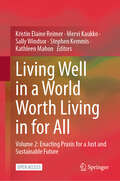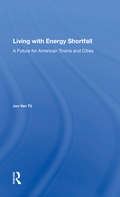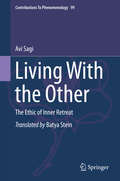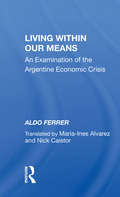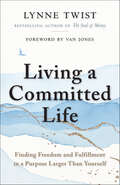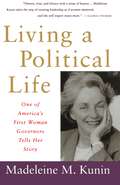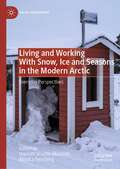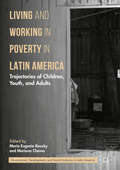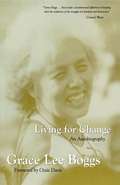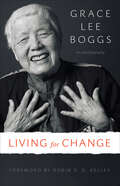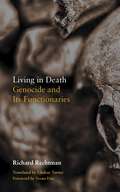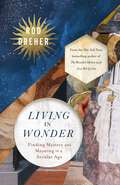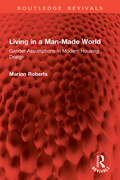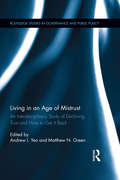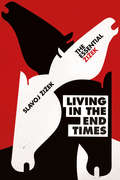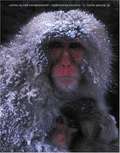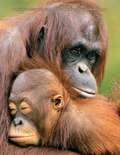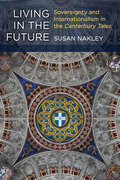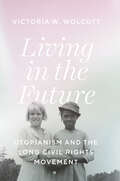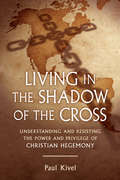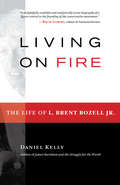- Table View
- List View
Living Wages and the Welfare State: The Anglo-American Social Model in Transition
by Shaun WilsonAre living wages an unaffordable and unwieldy aspiration or a key progressive reform? Demands for fair minimum incomes have dominated national debates amid the COVID-19 pandemic. This topical book addresses the rapidly shifting politics of minimum wages in US, the UK, New Zealand, Canada, Ireland and Australia, where workfare has compelled many to find low-income work and where neoliberal thinking about minimum wages has prevailed. Analysing minimum wage policies within a political-economy narrative, this innovative book offers an alternative to the Basic Income narrative and identifies the success of Living Wage campaigns as central to welfare state change.
Living Weapons: Biological Warfare and International Security
by Gregory D. Koblentz"Biological weapons are widely feared, yet rarely used. Biological weapons were the first weapon prohibited by an international treaty, yet the proliferation of these weapons increased after they were banned in 1972. Biological weapons are frequently called ‛the poor man’s atomic bomb,’ yet they cannot provide the same deterrent capability as nuclear weapons. One of my goals in this book is to explain the underlying principles of these apparent paradoxes."-from Living Weapons Biological weapons are the least well understood of the so-called weapons of mass destruction. Unlike nuclear and chemical weapons, biological weapons are composed of, or derived from, living organisms. In Living Weapons, Gregory D. Koblentz provides a comprehensive analysis of the unique challenges that biological weapons pose for international security. At a time when the United States enjoys overwhelming conventional military superiority, biological weapons have emerged as an attractive means for less powerful states and terrorist groups to wage asymmetric warfare.Koblentz also warns that advances in the life sciences have the potential to heighten the lethality and variety of biological weapons. The considerable overlap between the equipment, materials and knowledge required to develop biological weapons, conduct civilian biomedical research, and develop biological defenses creates a multiuse dilemma that limits the effectiveness of verification, hinders civilian oversight, and complicates threat assessments.Living Weapons draws on the American, Soviet, Russian, South African, and Iraqi biological weapons programs to enhance our understanding of the special challenges posed by these weapons for arms control, deterrence, civilian-military relations, and intelligence. Koblentz also examines the aspirations of terrorist groups to develop these weapons and the obstacles they have faced. Biological weapons, Koblentz argues, will continue to threaten international security until defenses against such weapons are improved, governments can reliably detect biological weapon activities, the proliferation of materials and expertise is limited, and international norms against the possession and use of biological weapons are strengthened.
Living Well in a World Worth Living in for All: Volume 1: Current Practices of Social Justice, Sustainability and Wellbeing
by Stephen Kemmis Kathleen Mahon Mervi Kaukko Kristin Elaine Reimer Sally WindsorThis open access book is the first of a two-volume series focusing on how people are being enabled or constrained to live well in today’s world, and how to bring into reality a world worth living in for all. The chapters offer unique narratives drawing on the perspectives of diverse groups such as: asylum-seeking and refugee youth in Australia, Finland, Norway and Scotland; young climate activists in Finland; Australian Aboriginal students, parents and community members; families of children who tube feed in Australia; and international research students in Sweden. The chapters reveal not just that different groups have different ideas about a world worth living in, but also show that, through their collaborative research initiative, the authors and their research participants were bringing worlds like these into being. The volume extends an invitation to readers and researchers in education and the social sciences to consider ways to foster education that realises transformed selves and transformed worlds: the good for each person, the good for humankind, and the good for the community of life on the planet. The book also includes theoretical chapters providing the background and rationale behind the notion of education as initiating people into ‘living well in a world worth living in'. An introductory chapter discusses the origins of the concept and the phrase.
Living Well in a World Worth Living in for All: Volume 2: Enacting Praxis for a Just and Sustainable Future
by Stephen Kemmis Kathleen Mahon Mervi Kaukko Kristin Elaine Reimer Sally WindsorThis open access book is the second of a two-volume series that explores how people are living well and creating a “World Worth Living in for All”. It engages in deep listening of voices from across the world and considers the role of education in creating a more just and sustainable world for the future. The book asks what can be learnt to create change in policy and practice in order to enact praxis. It showcases chapters from international authors who discuss current or new projects to address the overarching questions explored in the book. It also provides an overview of perspectives that connect both volumes and the individual projects presented together through the lens of practice architectures.
Living With Energy Shortfall: A Future For American Towns And Cities
by Jon Van TilThis book is about the ways Americans may live in the years ahead and the forms their cities, suburbs, towns, and rural areas may take in the light of changing patterns of energy supply and societal affluence. It is written for the ultimate energy policy maker–the private citizen.
Living With the Other: The Ethic of Inner Retreat (Contributions To Phenomenology #99)
by Avi SagiThe book grapples with one of the most difficult questions confronting the contemporary world: the problem of the other, which includes ethical, political, and metaphysical aspects. A widespread approach in the history of the discourse on the other, systematically formulated by Emmanuel Levinas and his followers, has invested this term with an almost mythical quality—the other is everybody else but never a specific person, an abstraction of historical human existence. This book offers an alternative view, turning the other into a real being, through a carefully described process involving two dimensions referred to as the ethic of loyalty to the visible and the ethic of inner retreat. Tracing the course of this process in life and in literature, the book presents a broad and lucid picture intriguing to philosophers and also accessible to readers concerned with questions touching on the meaning of life, ethics, and politics, and particularly relevant to the burning issues surrounding attitudes to immigrants as others and to the relationship with God, the ultimate other.
Living Within Our Means: An Examination Of The Argentine Economic Crisis
by Aldo FerrerThis book originally published in 1985, looked at Argentina's international insolvency issues and looks at the dilemma of how to proceed in order to ensure its economic sovereignty; in other words, its right to its own destiny. The book goes beyond social and economic areas and concludes that for real independence the Argentine Government has to ta
Living a Committed Life: Finding Freedom and Fulfillment in a Purpose Larger Than Yourself
by Lynn TwistWhat would life be like if you committed to something larger than yourself? Find out in the newest book from global transformation thought leader Lynne Twist. How does one person make a difference in the world? People constantly seek to discover meaning in their lives, but as humans take on the challenges facing us in this decade and beyond, we're searching for it now more than ever. Living a Committed Life demonstrates the power of dedication that goes beyond the self and teaches how to live a committed life that enables you to draw on resources and capacities from your most authentic self. In five parts, Lynne Twist shows how to make and keep commitments, engage in individual and collective action, and discover ways to connect and collaborate to make a difference. By sharing stories and perspectives from her life, Twist reveals her unique experience as a thought leader and activist in multiple causes, from ending world hunger and protecting the Amazon rainforest to empowering women's leadership. The book presents the guiding principles that have enabled her own success and that turn inspiration into action for everyone.
Living a Political Life
by Madeleine May KuninThe first time Madeleine M. Kunin ran for office it was because she thought there ought to be more women in politics. In time she fulfilled that belief by becoming the first woman governor of Vermont. Throughout her career, Kunin found that the rules for women politicians were different: she would not be forgiven (nor would she forgive herself) for neglecting her family. She could not afford to display emotion at the wrong times lest she be thought "weak." And she would have to learn to play political hardball with the best of them while keeping her integrity.In Living a Political Life, Kunin-who is now Deputy Secretary of the U.S. Department of Education-takes a frank look at the challenges that confronted her as she tried not just to succeed in politics but to set a precedent for other women. In doing so, she illuminates both what it means to be a woman and what it means to be a public servant and gives us a memoir as thoughtful and revealing as any to emerge from the corridors of power.From the Trade Paperback edition.
Living and Working With Snow, Ice and Seasons in the Modern Arctic: Everyday Perspectives (Arctic Encounters)
by Monica Tennberg Hannah Strauss-MazzulloThis book describes everyday practices of life in changing Arctic winter conditions. The authors explore the contemporary and situated outdoor practices in different work settings in Finnish Lapland and investigate how, for example, tourism, reindeer herding, cattle breeding and urban snow management adapt to the physically limiting or enabling features of cold temperatures, snow and ice. The book also highlights individual and societal adjustments to such harsh conditions and their seasonal changes in mobility, including winter cycling, use of snow mobiles and walking with studded shoes. The impact of a warming climate is a great concern for those utilising the enabling qualities of winter weather. The need, then, for continuous adaptation in everyday practices of work and mobility will increase in the future.
Living and Working in Poverty in Latin America: Trajectories of Children, Youth, and Adults (Governance, Development, and Social Inclusion in Latin America)
by María Eugenia Rausky Mariana ChavesThis edited volume studies the complex interrelation of poverty, work, and different stages in the life course, and how it contributes to the permanent existence of poverty and inequality in vulnerable groups in society. Mechanisms of productions and reproduction of these relationships are identified through empirical research carried out in four Latin American countries: Mexico, Argentina, Brazil, and Cuba. This book centers on the experiences of individuals in those less favored social groups who may have suffered structural poverty for decades, or who may have been simply deprived of a basic income to cover their most essential needs.
Living for Change
by Grace Lee BoggsLiving for Change is a sweeping account of the life of an untraditional radical from the end of the thirties, through the cold war, the civil rights era, and the rise of Black Power, the Nation of Islam, and the Black Panthers to the present efforts to rebuild our crumbling urban communities. This fascinating autobiography traces the story of a woman who transcended class and racial boundaries to pursue her passionate belief in a better society. Grace Lee Boggs was raised in New York City during a time when her father was not allowed to buy land for their home because he was Chinese. Educated at Barnard and Bryn Mawr, Boggs was in her twenties when radical politics beckoned, and she was inspired to become a revolutionary focusing on the black community.During her early years as an activist in New York, Boggs began a twenty-year friendship and collaboration with C. L. R. James, the brilliant and influential West Indian Marxist to whom she devotes a revelatory chapter of this book. In 1953, she moved to Detroit where, she writes, "radical history had been made and could be made again." It was also the home of James Boggs, an African American auto worker (and later author and revolutionary theoretician) who would become one of the movement's freshest and most persuasive voices, as well as Grace's husband. Beginning with their work together on the newsletter Correspondence, Grace and James formed the core of a network that over the years would include Malcolm X, Lyman Paine, Ping Ferry, Ossie Davis and Ruby Dee, Kwame Nkrumah, Stokely Carmichael, and inner-city youth.Rich in the personalities and anecdotes of twentieth-century progressive activism, Living for Change is an involving and inspiring look at a remarkable woman who continues to dedicate her life to social justice.
Living for Change: An Autobiography
by Grace Lee BoggsNo one can tell in advance what form a movement will take. Grace Lee Boggs&’s fascinating autobiography traces the story of a woman who transcended class and racial boundaries to pursue her passionate belief in a better society. Now with a new foreword by Robin D. G. Kelley, Living for Change is a sweeping account of a legendary human rights activist whose network included Malcolm X and C. L. R. James. From the end of the 1930s, through the Cold War, the Civil Rights era, and the rise of the Black Panthers to later efforts to rebuild crumbling urban communities, Living for Change is an exhilarating look at a remarkable woman who dedicated her life to social justice.
Living in Death: Genocide and Its Functionaries (Thinking from Elsewhere)
by Richard RechtmanWinner, Prix Littéraire Paris-Liège 2021 Winner, French Voices Award for Excellence in Publication and TranslationWhen we speak of mass killers, we may speak of radicalized ideologues, mediocrities who only obey orders, or bloodthirsty monsters. Who are these men who kill on a mass scale? What is their consciousness? Do they not feel horror or compassion?Richard Rechtman’s Living in Death offers new answers to a question that has haunted us at least since the Holocaust. For Rechtman, it is not ideologies that kill, but people. This book descends into the ordinary life of people who execute hundreds every day, the same way others go to the office. Bringing philosophical sophistication to the ordinary, the book constitutes an anthropology of mass killers.Turning away from existing psychological and philosophical accounts of genocide’s perpetrators, Rechtman instead explores the conditions under which administering death becomes a job like any other. Considering Cambodia, Rwanda, and other mass killings, Living in Death draws on a vast array of archival research, psychological theory, and anecdotes from the author’s clinical work with refugees and former participants in genocide. Rechtman mounts a compelling case for reframing and refocusing our attempts to explain—and preempt—acts of mass torture, rape, killing, and extermination.What we must see, Rechtman argues, is that for genocidaires (those who carry out acts that are or approach genocide), there is nothing extraordinary, unusual, or world-historical about their actions. On the contrary, they are preoccupied with the same mundane things that characterize any other job: interactions with colleagues, living conditions, a drink and a laugh at the end of the day. To understand this is to understand how things came to be the way they are—and how they might be different.
Living in Wonder: Finding Mystery and Meaning in a Secular Age
by Rod DreherIn 2018, at the end of a speech Rod Dreher gave in Genoa, an artist gave him an engraving by his own hand. In broken English, the artist explained that he was in his studio that afternoon when the Holy Spirit told him that he should come hear Rod Dreher, and give him a particular drawing of an obscure medieval saint. None of this made sense to Dreher until two years later, lost in depression and confusion, the saint - a Tuscan hermit named Galgano - appeared in Dreher's life again under circumstances that did not at all seem coincidental, sending Dreher on a search for God's will for his life. A lifetime of experiencing mystical events and collecting stories from others has solidified Dreher's Christian faith, and convinced him that God reveals himself to us all the time - but we in the modern West have lost our capacity to sense God's presence. How did this happen to us, but not to other peoples in the world? Can it be reversed? If so, how?LIVING IN WONDER tells the story of how the West became "disenchanted", and gives practical advice - based on history, cultural anthropology, and neuroscience, as well as the testimonies of monks of the ancient Church - on how to regain one's sense of wonder and awareness of the divine. Told through real-life stories of people who experienced miracles, visitations by saints and angels, and in some cases wrestled with demons, this book will open your mind to the reality that the material world is not all there is, and that God is not as silent and as elusive as you might think. You just need to learn how to see with clear eyes.Join Rod Dreher as he explores why contemporary Christianity seems so empty, and why so many young people are walking away from it. He argues that the enchanted sacramental vision of the church of the first millennium is still true, only hidden, and that the experience of God is something that can happen to anyone - if they are willing to take the risk.
Living in a Man-Made World: Gender Assumptions in Modern Housing Design (Routledge Revivals)
by Marion RobertsThere are powerful assumptions about gender divisions inscribed in the built environment. Housing is the site of some complex processes in society. In making and remaking their homes, women and men define their place in the world and are defined by it. Taking a historical perspective, Living in a Man-Made World (originally published in 1991) is the first to make a complete examination of the relationship of gender to housing design. Design is seen in broad terms and revealed as part of the social process of society, rather than a separate sphere in which the architect has sole responsibility for decision making. Many of the ills of the contemporary environment can be traced to the barriers that have been built up between the concerns of social policy, planning and architecture. By breaking down these barriers through a synoptic study of how gender assumptions have operated in the design of housing, this book points the way to how improvements in design and in the built environment may be better achieved.
Living in an Age of Mistrust: An Interdisciplinary Study of Declining Trust and How to Get it Back (Routledge Studies in Governance and Public Policy)
by Matthew N. Green Andrew I. YeoTrust is a concept familiar to most. Whether we are cognizant of it or not, we experience it on a daily basis. Yet trust is quickly eroding in civic and political life. Americans’ trust in their government has reached all-time lows. The political and social consequences of this decline in trust are profound. What are the foundations of trust? What explains its apparent decline in society? Is there a way forward for rebuilding trust in our leaders and institutions? How should we study the role of trust across a diverse range of policy issues and problems? Given its complexity, trust as an object of study cannot be claimed by any single discipline. Rather than vouch for an overarching theory of trust, Living in an Age of Mistrust synthesizes existing perspectives across multiple disciplines to offer a truly comprehensive examination of this concept and a topic of research. Using an analytical framework that encompasses rational and cultural (or sociological) dimensions of trust, the contributions found therein provide a wide range of policy issues both domestic and international to explore the apparent decline in trust, its impact on social and political life, and efforts to rebuild trust.
Living in the End Times
by Slavoj ZizekThe underlying premise of the book is a simple one: the global capitalist system is approaching an apocalyptic zero-point. Its four riders of the apocalypse are the ecological crisis, the consequences of the biogenetic revolution, the imbalances within the system itself (problems with intellectual property, the forthcoming struggle for raw materials, food and water), and the explosions of social divisions and exclusions. Society's first reaction is ideological denial, then explosions of anger at the injustices of the new world order, attempts at bargaining, and when this fails, depression and withdrawal set in. Finally, after passing through this zero-point we no longer perceive it as a threat, but as the chance for a new beginning. or, as Mao Zedong might have put it, "There is great disorder under heaven, the situation is excellent." i ek traces out in detail these five stances, makes a plea for a return to the Marxian critique of political economy, and sniffs out the first signs of a budding communist culture in all its diverse forms--in utopias that range from Kafka's community of mice to the collective of freak outcasts in the TV series Heroes.
Living in the Environment: Principles, Connections, and Solutions (13th Edition)
by G. Tyler MillerMiller's LIVING IN THE ENVIRONMENT, 13th Edition is a science-based book designed for introductory courses in environmental science. Tyler Miller is the most successful author in environmental science instruction because of his attention to currency, trend-setting presentation, outstanding student and instructor supplements, and his ability to retain and refine the pedagological hallmarks on which instructors have come to depend. In this edition Miller has added an on-line Web- based resource, entitled the Resource Integration Guide, which is updated quarterly with CNN. Today video clips, animations, and articles from InfoTrac. College Edition. Instructors can seamlessly incorporate current news articles and research findings to support classroom instruction. And, for the first time ever, students will receive a complementary CD-ROM entitled Interactive Concepts in Environmental Science. This groundbreaking addition integrates nearly 100 engaging animations and interactions with chapter summaries, flashcards, and Web-based quizzes. Organized by chapter, students will find links to relevant resources, narrated animations, interactive figures and prompts to review material and test themselves. The content in the Thirteenth Edition of LIVING IN THE ENVIRONMENT is everything you have come to expect and more.
Living in the Environment: Principles, Connections, and Solutions (Wadsworth Biology Ser.)
by Jr. G. Tyler MillerNIMAC-sourced textbook
Living in the Future: Sovereignty and Internationalism in the Canterbury Tales
by Susan NakleyNationalism, like medieval romance literature, recasts history as a mythologized and seamless image of reality. Living in the Future analyzes how the anachronistic nationalist fantasies in Geoffrey Chaucer’s Canterbury Tales create a false sense of England’s historical continuity that in turn legitimized contemporary political ambitions. This book spells out the legacy of the Tales that still resonates throughout English literature, exploring the idea of England in the medieval literary imagination as well as critiquing more recent centuries’ conceptions of Chaucer’s nationalism. Chaucer uses two extant national ideals, sovereignty and domesticity, to introduce the concept of an English nation into the contemporary popular imagination and reinvent an idealized England as a hallowed homeland. For nationalist thinkers, sovereignty governs communities with linguistic, historical, cultural, and religious affinities. Chaucerian sovereignty appears primarily in romantic and household contexts that function as microcosms of the nation, reflecting a pseudo-familial love between sovereign and subjects and relying on a sense of shared ownership and judgment. This notion also has deep affinities with popular and political theories flourishing throughout Europe. Chaucer’s internationalism, matched with his artistic use of the vernacular and skillful distortions of both time and space, frames a discrete sovereign English nation within its diverse interconnected world. As it opens up significant new points of resonance between postcolonial theories and medieval ideas of nationhood, Living in the Future marks an important contribution to medieval literary studies. It will be essential for scholars of Middle English literature, literary history, literary political and postcolonial theory, and literary transnationalism.
Living in the Future: Utopianism and the Long Civil Rights Movement
by Victoria W. WolcottLiving in the Future reveals the unexplored impact of utopian thought on the major figures of the Civil Rights Movement. Utopian thinking is often dismissed as unrealistic, overly idealized, and flat-out impractical—in short, wholly divorced from the urgent conditions of daily life. This is perhaps especially true when the utopian ideal in question is reforming and repairing the United States’ bitter history of racial injustice. But as Victoria W. Wolcott provocatively argues, utopianism is actually the foundation of a rich and visionary worldview, one that specifically inspired the major figures of the Civil Rights Movement in ways that haven’t yet been fully understood or appreciated. Wolcott makes clear that the idealism and pragmatism of the Civil Rights Movement were grounded in nothing less than an intensely utopian yearning. Key figures of the time, from Martin Luther King Jr. and Pauli Murray to Father Divine and Howard Thurman, all shared a belief in a radical pacificism that was both specifically utopian and deeply engaged in changing the current conditions of the existing world. Living in the Future recasts the various strains of mid-twentieth-century civil rights activism in a utopian light, revealing the power of dreaming in a profound and concrete fashion, one that can be emulated in other times that are desperate for change, like today.
Living in the Future: Utopianism and the Long Civil Rights Movement
by Victoria W. WolcottLiving in the Future reveals the unexplored impact of utopian thought on the major figures of the Civil Rights Movement. Utopian thinking is often dismissed as unrealistic, overly idealized, and flat-out impractical—in short, wholly divorced from the urgent conditions of daily life. This is perhaps especially true when the utopian ideal in question is reforming and repairing the United States’ bitter history of racial injustice. But as Victoria W. Wolcott provocatively argues, utopianism is actually the foundation of a rich and visionary worldview, one that specifically inspired the major figures of the Civil Rights Movement in ways that haven’t yet been fully understood or appreciated. Wolcott makes clear that the idealism and pragmatism of the Civil Rights Movement were grounded in nothing less than an intensely utopian yearning. Key figures of the time, from Martin Luther King Jr. and Pauli Murray to Father Divine and Howard Thurman, all shared a belief in a radical pacificism that was both specifically utopian and deeply engaged in changing the current conditions of the existing world. Living in the Future recasts the various strains of mid-twentieth-century civil rights activism in a utopian light, revealing the power of dreaming in a profound and concrete fashion, one that can be emulated in other times that are desperate for change, like today.
Living in the Shadow of the Cross: Understanding and Resisting the Power and Privilege of Christian Hegemony
by Paul KivelHow our dominant Christian worldview shapes everything from personal behavior to public policy (and what to do about it)Over the centuries, Christianity has accomplished much which is deserving of praise. Its institutions have fed the hungry, sheltered the homeless, and advocated for the poor. Christian faith has sustained people through crisis and inspired many to work for social justice.Yet although the word "Christian" connotes the epitome of goodness, the actual story is much more complex. Over the last two millennia, ruling elites have used Christian institutions and values to control those less privileged throughout the world. The doctrine of Christianity has been interpreted to justify the killing of millions, and its leaders have used their faith to sanction participation in colonialism, slavery, and genocide. In the Western world, Christian influence has inspired legislators to continue to limit women's reproductive rights and has kept lesbians and gays on the margins of society.As our triple crises of war, financial meltdown, and environmental destruction intensify, it is imperative that we dig beneath the surface of Christianity's benign reputation to examine its contribution to our social problems. Living in the Shadow of the Cross reveals the ongoing, everyday impact of Christian power and privilege on our beliefs, behaviors, and public policy, and emphasizes the potential for people to come together to resist domination and build and sustain communities of justice and peace.Paul Kivel is the award-winning author of Uprooting Racism and the director of the Christian Hegemony Project. He is a social justice activist and educator who has focused on the issues of violence prevention, oppression, and social justice for over forty-five years.
Living on Fire: The Life of L. Brent Bozell Jr.
by Daniel Kelly&“A triumph . . . A moving, beautifully written biography.&” —National ReviewFrom the beginning, L. Brent Bozell seemed destined for great things. An extraordinary orator, the young man with fiery red hair won a national debate competition in high school and later was elected president of Yale&’s storied Political Union, where his debating partner was his close friend William F. Buckley Jr. In less than a decade after graduating from Yale, Bozell helped Buckley launch National Review, became a popular columnist and speaker, and, most famously, wrote Barry Goldwater&’s landmark book The Conscience of a Conservative. But after setting his sights on high political office, Bozell took a different route in the 1960s. He abruptly moved his family to Spain; he founded a traditional Catholic magazine, Triumph, that quickly turned radical; he repudiated on religious grounds the U.S. Constitution; he made it his mission to transform America into a Catholic nation; he led the nation&’s first major antiabortion protest (featuring a militant group known as the Sons of Thunder); he severed ties with his erstwhile friends from the conservative movement, including Buckley (who was also his brother-in-law). By the mid-1970s, Bozell had fallen prey to bipolar disorder and alcoholism, leading life as if &“manacled to a roller coaster.&” Biographer Daniel Kelly tells Bozell&’s remarkable story vividly and with sensitivity in Living on Fire. To write this book, Kelly interviewed dozens of friends and family members and gained unprecedented access to Bozell&’s private correspondence. The result is a richly textured portrait of a gifted, complex man—his triumphs as well as his struggles.
